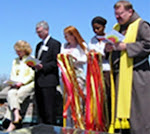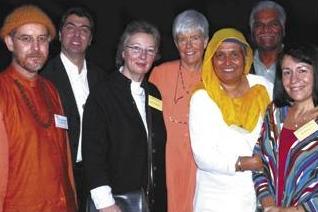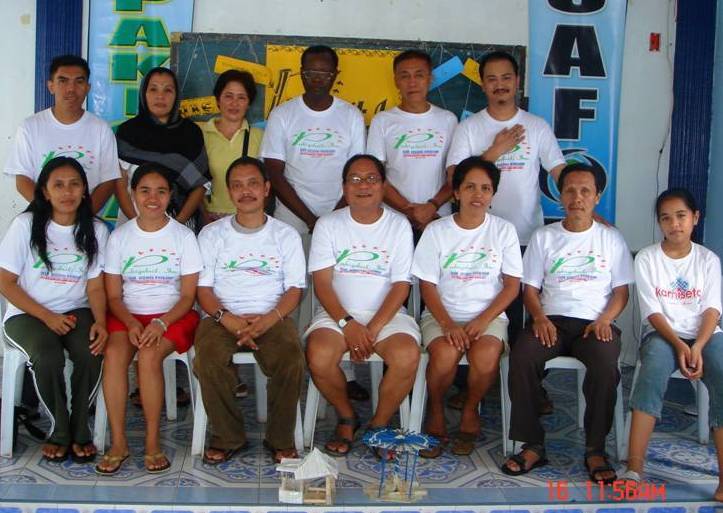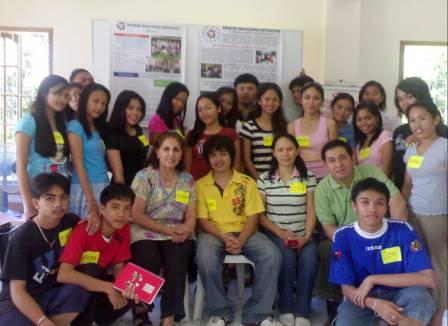An inspirational message from REV. CANON CHARLES P. GIBBS (Executive Director, URI)
March 10, 2007 - URI MI Manila
Dear Friends,
Greetings of love and peace at the end of a long and extraordinarily full day from Manila!
I don’t have the energy to share everything I’d like, but I do want to offer a few highlights from the day.
First, URI is blessed with extraordinary leaders, and some of them are here for this workshop.
Today we heard from our host team from the Peacemakers Circle of the Phils. Their growth from a small & easily ignored grassroots group into a national resource working in partnership with many organizations, including the Office of the Presidential Advisor to the Peace Process, is inspiring & presents a compelling model of how URI’s grassroots work can develop into a significant force, making valued contributions on a national level & beyond.
Their pioneering work in Christian - Muslim dialogue is being extended into four communities in Metro Manila and may be a cornerstone of an imagined summer peace institute at the University of the Philippines.
In spite of their success, and requests for partnerships, funding remains elusive. Work that is clearly seen as being of tremendous value, with frequent requests that the Peacemakers Circle expand its efforts, is not deemed worthy of funding by many obvious funding sources. We spent sometime brainstorming possible funding sources, but finally were left standing in a prayer circle offering our intentions that this great and valuable work will attract the funding it needs to survive and thrive; and that its sacrificial leaders are rewarded in ways that allow them to survive and thrive.
We spent a considerable amount of time today on listening, beginning with a one question appreciative interview in pairs – people were asked to share the story of how they had come to understand the purpose of their life, and to share how their religion – through a teaching, a sacred text, a mentor – had inspired that understanding. The conversations were animated and led to comments like these:
- I felt like I’ve known my partner all my life.
- We were talking from different books and different languages, but we share the same understanding.
- If we emphasize dogma, we will be divided, but if we talk about service, we will be united.
We also spent some time exploring the importance of creativity in peacebuilding work. Herm Weaver offered the following guiding principles from a musical project he did as part of his doctoral work:
…to be guided by internal rather than external standard
…to be honest
…to be simple
…to make space for the listener to participate
…creating music that grew out of our hearts as much as our heads
…committed to a flexible timeframe
…committed to having fun
Our reflections on these points led the Uganda team to reflect that a key challenge they face these days is a conflict between an internal standard of restorative justice and the external practice represented by the International Criminal Court.
They proceeded to describe their own internal restorative justice system – matopput (drinking the bitter root). In this practice, each party acknowledges what they have done wrong and asks for forgiveness. Then, with hands behind their backs to show that they are through fighting, they drink together out of a calabash of an herbal drink as a sign that they will forgive and be forgiven, and will move forward positively.
The Acholi leaders now have hired lawyers to document the process of matopput so that it might become acceptable to the ICC and open a way past the current stalemate in their peace efforts.
We also heard from the Peacemakers Circle that commitment to staying true to their internal standards has made it a challenge to attract funding, since so many funders have a rigorous set of external standards that would draw them away from what they feel is the most essential work to be done and the best way to do that work.
And so we have worked our way through a Saturday filled with new insights, laughter and tears here in Manila; through a day that has made me more deeply aware of how precious is the unique community we are creating, of the extraordinary value and potential of our work, and of the deep challenges we face individually and together.
May we all be blessed in our work for peace, justice and healing.
Love,
Charles
*











